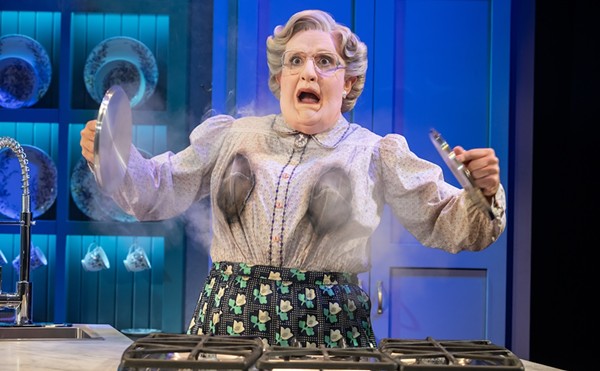It's one of those ideas that probably sounded great at a party: a book about poop that pinches off puns but contains an overview of where the stuff actually sits in pop culture. Dave Praeger, author of the new Poop Culture: How America Is Shaped by Its Grossest National Product is no novice to such bathroom banter. He created and edits PoopReport.com, a website that focuses on toilet mishap stories frequented by fecesphiles with such screen names as GottaGoGirl and AssBlaster2000.
Among ads for colon cleansers and earnest posts (such as "Life with Ostomy") are yarns told with self-consciously literate hyperbole — like the guy who compares the stinky man in the next stall to the Jabberwocky.
But for all his cheek, Praeger, who recently pontificated in the New York Times about what's "scatologically correct," is serious about our Victorian-inspired attitudes toward la toilette. In Poop Culture, he talks of how poo should be viewed as a resource and put back in its natural place in the food cycle. But will anyone dig deep enough into this pile of puns and graphic descriptions (read: the correct way to wipe your ass) to actually find something useful?
Here Praeger comes clean:
You want to make serious observations about pop culture, yet you thrive on silly puns. Do you think the humor might ultimately undercut the intent of your message?
It was hard to find the right balance. Even the most academic books still use puns and jokes. I think that if you're talking about stuff that's taboo, you need to use humor to take the power of the taboo away so people can't take it seriously.
What kind of reaction have you gotten from the book?
I'll go on some stupid morning show and we'll make poop jokes and puns for 20 minutes. Other people will go into the Freudian and the ecological. It all depends on who is reading it and what they want to get out of it.
Do you find people open up more when they talk to you about the book? I'm assuming people have a strong reaction.
When I'm with people that I've never met, once the subject of the book comes up they look at me like I'm disgusting, like I'm contaminated. But once they understand what it is and what it isn't, they open up.
What kind of things do they tell you?
Oh, this-and-that kind of horror bathroom story happened, "I was driving in traffic and I couldn't help it" — that kind of bathroom-gone-wrong horror story. Then there are the people who say, "I've always wondered: What is the right way to hang toilet paper?" or, "Why don't Americans use bidets?" With those kinds of people, it's easier to get to more serious topics, to move the conversation to ideology. Those are the aspects that interest me the most.
Can you explain your political angle about the toilet?
It was invented by the Victorians to distance themselves from the masses. The waste went into the water, and then you would press the button and it would disappear. You could begin to pretend that you were different than the stinking, disgusting poor people. The ideology became that poop is something that should not be seen or heard or smelled, and should take place in private bathrooms and no one should know about it. And from that sprung the ideology that it's evil.
So are you saying that people should be pooping out in the open more?
Not at all. I'm just more interested in how our current position came around in the first place. There are certainly health reasons to keep it in the bathroom and not do it on the street. The science behind that is clear. I don't necessarily condemn the system because it came down from the stratification of the Victorians; I just want to show this is where it came from in the first place.
I did get the impression you were looking for some sort of change in our current bathroom scenario.
The change I'm trying to effect is to get people to view waste not as a waste but as a resource. In terms of human waste, I think it is shameful that we have detached ourselves from the natural food cycle. If anything, I want people to start re-evaluating what comes out of our bodies not as something that must be distanced from ourselves and gone forever but rather as a resource, and that represents our place in the natural cycle.
I think that what you've done in some of the cases is created smart, clever bathroom humor. Do you think the world is ready for that?
I sure hope so; my sales will tell. I think it is easy to create dumb bathroom humor and I think my humor takes its more rewarding traits from bathroom humor. On my website the stories that are most prized are ones that are really well-constructed and use a lot of great metaphors, great use of the English language.
To be honest, I felt uncomfortable at times reading this book … I couldn't read it while eating.
The goal in everything I've done is not to have anything that my mom wouldn't want to see.
Explain "shameful shitter."
That particular term holds a lot of meaning in the Poop Report community. We've used it for years before the book began, that division between the shameful and the shameless, and I couldn't really abandon it.
So are you a shameful shitter?
I'm what we call an enlightened shitter in the sense that I don't hide it but I don't broadcast it.
[email protected]















